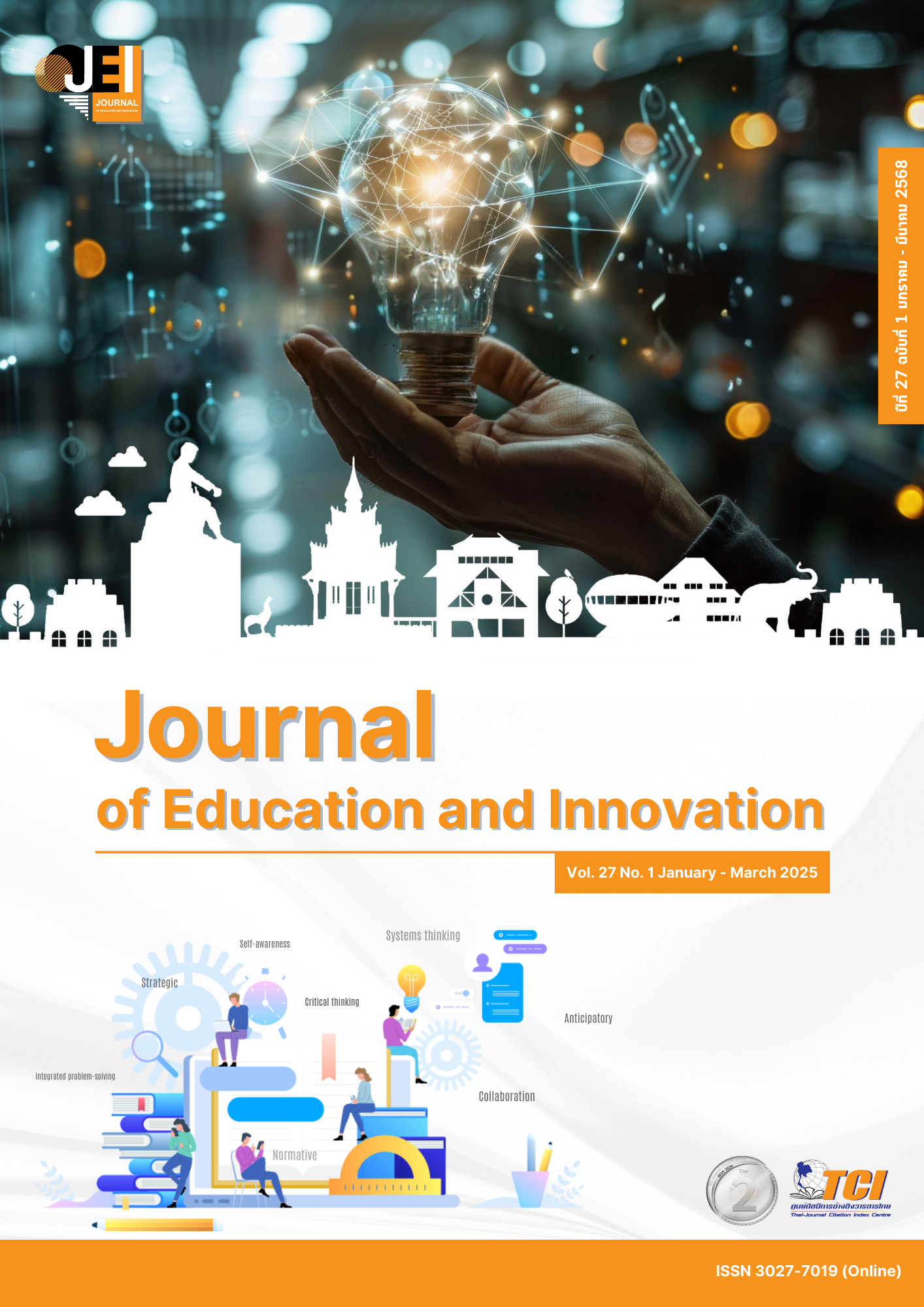THE DEVELOPMENT OF LEARNING ACTIVITIES WITH A PROJECT BASED LEARNING AND DIGITAL LEARNING TOOLS TO PROMOTE THE ENTREPRENEURIAL SKILLS FOR STUDENTS AT GRADE 12
Main Article Content
Abstract
This research purposes were 1) To develop and improve the quality of academic activities through the framework as a combination of digital learning tools to promote entrepreneurial skills for grade12. 2) To compare pre- and post-knowledge of entrepreneurship. 3) To study entrepreneurial skills. 4) To study satisfaction with the use of digital learning tools, A group of samples include students in grade 12 at the Nongchangwittaya School, Uthaithani province. Thirty-six students were selected by purposive sampling. Research tools include activities plans of Project-Based Learning and Digital learning tools to promote entrepreneurial skills, pretest and posttest, entrepreneurial skills test, and satisfaction questionnaire. The statistics used to analyze the data were percentage, mean, standard division and Non-probability Sampling. The result were concluded as follow: 1) the activities plans of Project-Based Learning and Digital tools to promote entrepreneurial skills have five steps: 1) Define 2) Plan 3) Do 4) Review 5) Presentation and the quality of activities plans of Project-Based Learning and Digital tools to promote entrepreneurial skills were most suitable on highest level ( = 4.72, SD = 0.31) 2) students in grade 12 had posttest scores statistical significant at .05 level higher than pretest scores. 3) the overall entrepreneurial skills are at a very good level, with 80.47 percent passing the criteria. 4) the satisfaction of students in grade 12 after studied towards activities plans of Project-Based Learning and Digital tools to promote entrepreneurial skills were totally highest level (
= 4.71, SD = 0.35).
Article Details

This work is licensed under a Creative Commons Attribution-NonCommercial-NoDerivatives 4.0 International License.
The owner of the article does not copy or violate any of its copyright. If any copyright infringement occurs or prosecution, in any case, the Editorial Board is not involved in all the rights to the owner of the article to be performed.
References
Barrow, H. S. (2018). How to Design a Problem Based Curriculum for the Preclinical Years. New York: Springer Publishing.
Boonyasiwapong, P., & Sriphan, A. (2023). Activities to enhance entrepreneurial skills by using community business establishments for high school students in Thung Saliam District Sukhothai Province (Master thesis). Phitsanulok: Naresuan University.
Jaiwongya, R. (2017). Satisfaction with Project-Based Learning in STA423 Non-Parametric Statistics Course. In Proceedings of the 9th Rajamangala University of Technology Academic Conference: Creative RMUT and Sustainable Innovation for Thailand 4.0.
Jongchaloemchai, P., Yamrung, R., & Cheausuwantavee, C. (2021). Development of Learning Management Model for Enhancing Preservice Teachers’Creative Problem-Solving Skill. Journal of Research and Curriculum Development, 11(1), 132-142.
Kittikantakorn, K. (2020). The Development of the “Entrepreneurship” Club Activity Curriculum Based on Cognitive Apprenticeship Model for Upper Secondary School Students (Master thesis). Phitsanulok: Naresuan University.
Kongmanus, K. (2018). Digital learning tools: Ways of digital education era. Journal of Education Naresuan University, 20(4), 279-290.
KuhaRueangrong, K. (2010). A Comparison of Problem-Solving Ability and Attitudes Toward Career and Technology Education Among Grade 7 Students Between Project-Based Learning and the Learning Cycle Approach (Master thesis). Phra Nakhon Si Ayutthaya: Phra Nakhon Si Ayutthaya Rajabhat University.
Nokkeaw, P. (2019). Life and career skills in the 21st century of secondary 3 (Grade 9) students in Samutprakan province (Master thesis). Bangkok: Rajamangala University of Technology Thanyaburi.
Panich, W. (2012). The Learning Pathway for Students in the 21st Century. Bangkok: Sodsri-Saridwongsa Foundation.
Saechan, T., & Morsorn, T. (2017). Digital Literacy: Definition, Component and Current Situation. Journal of Information Science Research and Practice, 34(4), 116-145.
Sriprapai, P. (2021). Project-Based Learning to Enhance Students’ Innovation Capability (Master thesis). Bangkok: Srinakharinwirot University.
Yoelao, D., et al. (2014). A Study on PBL Implementation Derived from the Knowledge Development Project to Enhance 21st-Century Skills of Children and Youth: Lessons from Successful Thai Schools. Bangkok: Thipwisut Partnership Limited.


